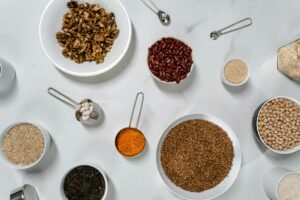Muscle-building isn’t just about lifting heavy weights; it’s equally about fueling your body with the right nutrients. Nutrition provides the energy to power through tough workouts, supports recovery, and allows your muscles to grow larger and stronger. It’s not merely a matter of eating more but eating the right foods, in the right quantities, and at the right times. This guide dives deep into how you can build muscle effectively by optimizing your diet, exercise habits, and overall approach.
1. Protein: The Essential Building Block for Muscle Growth
Protein is the cornerstone of muscle development. When you work out, your muscles undergo microscopic tears, and protein supplies the amino acids needed for repair and growth, a process called muscle protein synthesis. Without enough protein, your body cannot effectively repair and strengthen muscles, hindering progress.
How Much Protein Do You Need?
To support muscle growth, you should aim for 1.2 to 2.2 grams of protein per kilogram of body weight per day. This range allows for individual differences:
- For beginners or individuals with moderate activity levels, 1.2–1.6 grams per kilogram is sufficient.
- For those with intense training regimens, go higher—1.6–2.2 grams per kilogram.
For example:
- A 70 kg (154 lbs) person would require between 84 and 154 grams of protein per day.
- A highly active 90 kg (198 lbs) person may need 144 to 198 grams daily.

Timing Your Protein Intake
Protein distribution throughout the day matters. Research shows that spreading protein intake evenly across meals maximizes muscle protein synthesis.
- Start with Breakfast: Include 20-30 grams of protein to kickstart muscle repair after fasting overnight.
- Pre- and Post-Workout: Consume 20-40 grams of protein within an hour before and after exercise to optimize muscle repair.
- Before Bed: A slow-digesting protein, such as casein from cottage cheese or Greek yogurt, provides a steady amino acid release while you sleep, aiding overnight recovery.
For detailed information on protein requirements and their role in muscle synthesis, refer to the International Society of Sports Nutrition’s position stand on protein and exercise.
Complete vs. Incomplete Proteins
Complete proteins contain all nine essential amino acids, making them ideal for muscle-building. Examples include:
- Animal-based sources: Chicken, turkey, beef, fish, eggs, and dairy.
- Plant-based sources: Soy, quinoa, and buckwheat.
If you follow a plant-based diet, combining foods like rice and beans or peanut butter and whole-grain bread ensures you get all essential amino acids.
2. Carbohydrates and Fats: Energy and Hormonal Support

While protein is the star, carbohydrates and fats play vital roles in muscle-building. Carbs provide the glycogen your muscles need for energy during workouts, while fats support hormone production, including testosterone, which is crucial for muscle growth.
Carbohydrates: Your Muscle Fuel
Carbs replenish glycogen stores, ensuring you have the energy to train hard. Without enough carbs, workouts suffer, and recovery slows.
- Daily Intake: Consume 3-5 grams of carbohydrates per kilogram of body weight. For example, a 70 kg individual would need 210-350 grams of carbs daily.
- Best Sources: Focus on complex carbs such as oats, brown rice, whole grains, sweet potatoes, fruits, and vegetables.
Carb Timing
- Before Workouts: Eat a carb-rich meal 1-2 hours before exercise to fuel performance. A good option might include oatmeal with banana or a whole-grain sandwich with lean protein.
- After Workouts: Pair carbs with protein post-exercise to replenish glycogen and kickstart recovery. A protein shake with fruit or grilled chicken with sweet potatoes are excellent choices.
Fats: Hormonal Health and Recovery
Healthy fats regulate hormones like testosterone, which is essential for muscle growth and recovery.
- Daily Intake: About 20-30% of your total calorie intake should come from fats.
- Best Sources: Include fatty fish (salmon, mackerel), avocados, olive oil, nuts, seeds, and dark chocolate in your diet.
3. Creating a Caloric Surplus
Muscle growth requires a caloric surplus, meaning you need to consume more calories than you burn. This surplus provides the extra energy your body needs to repair and grow muscle tissue.
Need help finding your caloric requirements? Try The Mayo Clinic’s Calorie Calculator!
Steps to Calculate Your Caloric Needs
- Calculate Your BMR (Basal Metabolic Rate): This is the number of calories your body needs to maintain basic functions like breathing and circulation. Use an online calculator based on your age, weight, height, and sex.
- Adjust for Activity Level: Multiply your BMR by an activity factor:
- Sedentary: 1.2
- Lightly active: 1.375
- Moderately active: 1.55
- Very active: 1.725
- Add Calories for Muscle Gain: Add 250–500 calories per day depending on your goals:
- Add 250 calories for a slow, lean muscle gain.
- Add 500 calories for faster muscle-building (may result in some fat gain).
Tips to Maintain a Surplus
- Frequent Meals: Eating 5-6 smaller meals can make it easier to meet your calorie needs without feeling overly full.
- Calorie-Dense Foods: Opt for nutrient-rich, high-calorie options like nuts, seeds, dried fruits, whole grains, and healthy fats.
4. Hydration: A Hidden Key to Muscle Growth

Hydration is often overlooked but is crucial for performance and recovery. Muscles are made up of about 75% water, and even mild dehydration can lead to reduced strength, endurance, and slower recovery.
Hydration Tips
- Drink 3-4 liters of water daily, more if you sweat heavily or live in a hot climate.
- Include hydrating foods like watermelon, cucumbers, and oranges.
- Add electrolytes through sports drinks or foods like bananas and coconut water during long or intense workouts.
5. Recovery: The Muscle Growth Phase
Muscle growth doesn’t happen during your workouts—it occurs during recovery. Proper rest and recovery allow your muscles to repair, adapt, and grow stronger.
Sleep for Muscle Growth
Sleep is when your body releases the most growth hormone, which drives muscle repair and growth.
- Aim for 7-9 hours of quality sleep each night.
- Avoid screens before bed and create a relaxing bedtime routine to improve sleep quality.
Active Recovery
Incorporate light activities like yoga, walking, or swimming on rest days to improve blood circulation and reduce muscle soreness.
6. Supplements: Enhancing Your Diet
Supplements are not a replacement for whole foods but can be useful in supporting your muscle growth goals.
Recommended Supplements
- Whey Protein: A quick and convenient way to meet protein needs, especially post-workout.
- Creatine: Boosts strength, power, and muscle recovery. Take 5 grams daily for best results.
- BCAAs: Helps reduce muscle soreness and improve recovery, especially during fasted training.
- Multivitamins: Fills potential micronutrient gaps.
If you would like to know more information about gut health supplements and probiotics, check out our Probiotics for Men article.
7. Micronutrients: The Unsung Heroes
While macronutrients (protein, carbs, and fats) dominate the conversation, micronutrients are just as critical for muscle growth.
Key Micronutrients
- Vitamin D: Supports bone health and testosterone levels.
- Magnesium: Reduces muscle cramps and supports relaxation.
- Zinc: Aids testosterone production and recovery.
- Iron: Enhances oxygen delivery to muscles.
8. Tracking Progress and Adjusting
Building muscle takes time, and consistency is key. To stay on track:
- Monitor Weight: Aim to gain 0.25–0.5 kg per week.
- Take Progress Photos: Visual changes often show more than numbers on a scale.
- Adjust Calories: If progress stalls, slightly increase your caloric intake.
Sample Muscle-Building Meal Plan
Here’s a detailed example of a daily meal plan for a 70 kg individual:
Breakfast:
- 3 scrambled eggs
- Whole-grain toast
- Avocado slices
- Banana
Snack:
- Greek yogurt with honey and granola
- Handful of mixed nuts
Lunch:
- Grilled chicken breast
- Quinoa
- Steamed broccoli
- Olive oil drizzle
Pre-Workout:
- Oatmeal with almond butter and blueberries
Post-Workout:
- Protein shake with banana and peanut butter
Dinner:
- Baked salmon
- Sweet potatoes
- Asparagus
Evening Snack:
- Cottage cheese
- Almonds
- Dark chocolate square
Conclusion
Building muscle is a combination of strategic eating, consistent training, and proper recovery. By prioritizing protein, balancing carbs and fats, staying hydrated, maintaining a caloric surplus, and ensuring adequate rest, you can optimize muscle growth. The journey takes time, but with dedication to both your diet and workouts, you’ll achieve sustainable, natural results.
Disclaimer:
The content provided here is for informational purposes only. This blog is not intended to substitute for medical advice, diagnosis, or treatment. Always seek the advice of a qualified healthcare provider for any questions or concerns you may have regarding a medical condition. Reliance does not endorse or recommend any specific tests, physicians, procedures, opinions, or other information mentioned on the blog.




